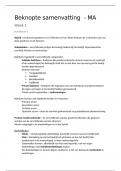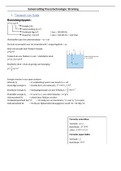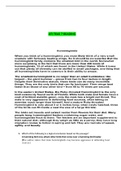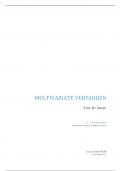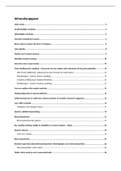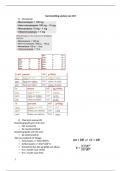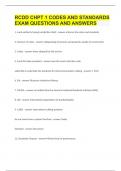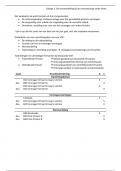SPP
Hoe krijg je het juiste aantal mensen op het juiste moment op de juiste plaats?
WC1:
9 Bouwstenen:
1. Voorbereiden en afbakenen (wat zijn strategische plannen en waar gaan
we ons op richten?)
a. Afbakenen
i. Welke organisatie en welk organisatieonderdeel
ii. Welke personeelsgroepen onderscheiden (vooral de
belangrijke functies die direct te maken hebben met kern van
bedrijf) (max 10 functies)
iii. Welke producten en diensten staan centraal
iv. Over welke periode (2-5 jaar)
v. Centraal of decentraal SPP? (Per vestiging= centraal of
hoofdkantoor bepaalt = decentraal)
2. Externe analyse: afzetmarkt en scenario’s toekomst
a. Planningstermijn 2-5 jaar
b. Gewenste formatie hangt af van organisatiestrategie (groei, krimp)
c. Scenario kan niet worden gekozen (hierop voorbereiden/
‘’onzekerheden reduceren’’)
d. Toekomst staat meestal niet vast
i. Afhankelijk van externe omgeving en concurrentiestrategie
3. Interne analyse: strategie, ambitie en huidige formatie (als ik kijk naar
strategie (bv groei) dan heeft het impact op ……. (Bv personeel, inkoop
etc.)
4. Toekomstig gewenste formatie (stoelen)
5. Huidige bezetting en dynamiek (smoelen)
6. Externe arbeidsontwikkelingen (arbeidsmarkt)
7. Toekomstig verwachte bezetting
8. Confrontatie vraag en aanbod en vaststellen gaps
9. Oplossingsrichtingen, maatregelen en actieplannen
Bezetting is hoeveel stoelen er bezet zijn (formatie is hoeveel stoelen er zijn)
Samenhang organisatiebeleid, HR-beleid en SPP
Organisatie heeft een strategie en HRM beleid sluit hierop aan (personeel).
Heeft invloed op strategische personeelsplanning (wie wanneer en hoeveel nodig,
komt tot stand in samenwerking, HR weet niet alles.) denken aan contracten. Ook
weer impact op PIOFACH (personeel, inkoop, organisatie, financiën,
automatisering, communicatie en huisvesting)
, Voorbeeld:
*Strategie organisatiebeleid
voorbeeld: marktleider van
rugzakken
*Strategisch HR-beleid: veel
personeel (ook nationaal)
Uitgangspunten
HRM is verweven met organisatiebeleid
HRM is gericht op benutting van resources en ontwikkeling van waarde en
potentieel
SPP vereis intensieve samenwerking tussen lijnmanagement en HR!
SPP maakt deel uit van planning en control cyclus
SPP is een management tool, HR faciliteert waar nodig
SPP = K3R
1. Right size = kwantiteit (handjes)
2. Right shape = kwaliteit (hersens)
3. Right costs = arbeidskosten (euro’s)
4. Right agility = veerkracht (relaties)
Hoe krijg je het juiste aantal mensen op het juiste moment op de juiste plaats?
WC1:
9 Bouwstenen:
1. Voorbereiden en afbakenen (wat zijn strategische plannen en waar gaan
we ons op richten?)
a. Afbakenen
i. Welke organisatie en welk organisatieonderdeel
ii. Welke personeelsgroepen onderscheiden (vooral de
belangrijke functies die direct te maken hebben met kern van
bedrijf) (max 10 functies)
iii. Welke producten en diensten staan centraal
iv. Over welke periode (2-5 jaar)
v. Centraal of decentraal SPP? (Per vestiging= centraal of
hoofdkantoor bepaalt = decentraal)
2. Externe analyse: afzetmarkt en scenario’s toekomst
a. Planningstermijn 2-5 jaar
b. Gewenste formatie hangt af van organisatiestrategie (groei, krimp)
c. Scenario kan niet worden gekozen (hierop voorbereiden/
‘’onzekerheden reduceren’’)
d. Toekomst staat meestal niet vast
i. Afhankelijk van externe omgeving en concurrentiestrategie
3. Interne analyse: strategie, ambitie en huidige formatie (als ik kijk naar
strategie (bv groei) dan heeft het impact op ……. (Bv personeel, inkoop
etc.)
4. Toekomstig gewenste formatie (stoelen)
5. Huidige bezetting en dynamiek (smoelen)
6. Externe arbeidsontwikkelingen (arbeidsmarkt)
7. Toekomstig verwachte bezetting
8. Confrontatie vraag en aanbod en vaststellen gaps
9. Oplossingsrichtingen, maatregelen en actieplannen
Bezetting is hoeveel stoelen er bezet zijn (formatie is hoeveel stoelen er zijn)
Samenhang organisatiebeleid, HR-beleid en SPP
Organisatie heeft een strategie en HRM beleid sluit hierop aan (personeel).
Heeft invloed op strategische personeelsplanning (wie wanneer en hoeveel nodig,
komt tot stand in samenwerking, HR weet niet alles.) denken aan contracten. Ook
weer impact op PIOFACH (personeel, inkoop, organisatie, financiën,
automatisering, communicatie en huisvesting)
, Voorbeeld:
*Strategie organisatiebeleid
voorbeeld: marktleider van
rugzakken
*Strategisch HR-beleid: veel
personeel (ook nationaal)
Uitgangspunten
HRM is verweven met organisatiebeleid
HRM is gericht op benutting van resources en ontwikkeling van waarde en
potentieel
SPP vereis intensieve samenwerking tussen lijnmanagement en HR!
SPP maakt deel uit van planning en control cyclus
SPP is een management tool, HR faciliteert waar nodig
SPP = K3R
1. Right size = kwantiteit (handjes)
2. Right shape = kwaliteit (hersens)
3. Right costs = arbeidskosten (euro’s)
4. Right agility = veerkracht (relaties)

